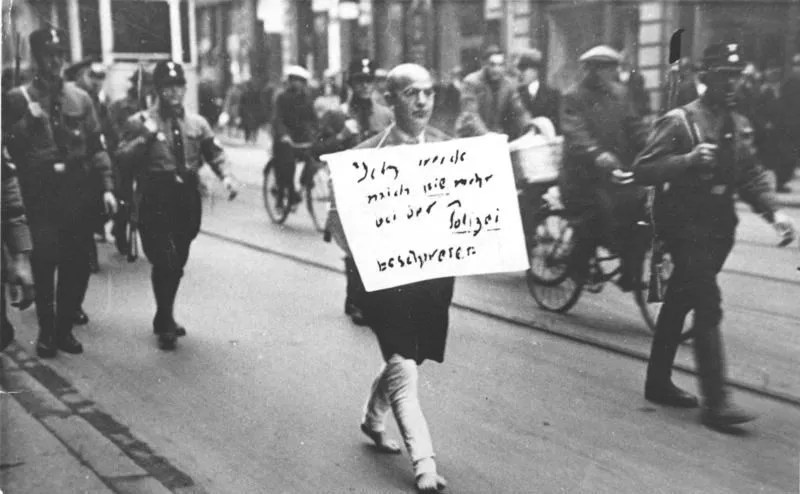
Photo by Michael Siegel

Audio By Carbonatix
A 2014 survey conducted by the Anti-Defamation League discovered that more than nine percent of adults in the United States harbor anti-Semitic sentiments. Thirty-three percent of participants found “Jews more loyal to Israel than to the U.S.,” and 16 percent found Jews to have too much power in the business world.
These statistics have only risen considering today’s post-facts zeitgeist, with extremism growing across the globe and pop-culture figures like Ye (AKA Kanye West) spewing anti-Semantic venom.
Hoping to serve as a reminder of what happens when extremism takes over is “Lawyers Without Rights: Jewish Lawyers in Germany Under the Third Reich,” on view at the Jewish Museum of Florida in Miami Beach until Friday, November 4. The exhibit opened on October 17 with a four-person panel titled “Erosion of Rights: From the Holocaust to the Present.” The exhibition tells visitors about the thousands of European Jewish lawyers who lost their right to practice during the Third Reich between 1933 and 1938.
The exhibit is cosponsored by the American Bar Association (ABA) and the Bundesrechtsanwaltskammer (German Federal Bar).
The exhibit highlights how societal breakdown doesn’t always happen when bullets fly in the town square. It can be a slow-rolling procedural hell that can be just as forceful as a boot to the face over and over. “Lawyers Without Rights” is meant to show how the rule of law decays when governments neglect the rights of the people by imposing unjust laws.
As the viewer, you walk through the 25 panels displayed throughout the Jewish Museum. Each panel tells the story of a lawyer who lost their ability to practice when the Third Reich began enforcing laws against Jews’ employment. Most were eventually sent to concentration camps across Europe.
One panel tells the story of Justizrat Georg Siegmann, who was admitted as a lawyer to the Berlin Regional Courts and practiced as a notary. A lawyer since 1914, he lost his right to practice when the Nazi party passed a 1938 general prohibition against Jews practicing law.
Dr. Elisabeth Kohn lost her license in 1933. She then worked at the welfare department of the Jewish Community and served as a legal consultant. Kohn, along with her mother and sister, were killed during the massacres in Kowno, Lithuania, later that year.
“Lawyers Without Rights” made its U.S. debut in 2004 at the Leo Baeck Institute in New York and has been traveling across the country ever since. The exhibit came to fruition when Tel-Aviv-based lawyer Joey Levy contacted the German Regional Bar in the 1990s.
“Joey Levy called the German Regional Bar and asked for a list of Jewish lawyers, and they couldn’t answer because they didn’t have a list,” Stephan Göcken, executive director of the German Federal Bar, tells New Times. “Nearly everything was destroyed in the war. And to be frank, no one did the research afterward.”
The Berlin Bar then took notice and started to conduct research in 1999, which spurred the idea of an exhibit for the Jewish community inside the German capital. The German Federal Bar joined the regional bar, producing over a decade of research from Berlin to Cologne and Munich.
“We travel around Germany bringing the exhibit to schools, other venues, and not just Jewish communities – there should be a learning experience from it,” Göcken explains.
After colleagues from various nations and continents reached out, “Lawyers Without Rights” began to travel across the globe.
The Berlin regional bar first hired an official researcher, and as different regions throughout Germany started conducting their independent research, the stories of Jewish lawyers grew so voluminous that they were immortalized in a book.
“At the regional bars, they engage with their own historians, so you have research in Cologne, Munich, Düsseldorf, and we set up a second group to have an overview,” Göcken says. “For those who were not killed in the Holocaust and then went abroad, why should they come back? Most of them starved because the problem of a lawyer is different from a doctor: lawyers have to learn the language, take an exam, and study the law. So imagine someone at 55 losing their family and law firm and then coming to the U.S. What were the alternatives? You are alone.”
You don’t need to be Jewish or a lawyer to get something out of “Lawyers Without Rights.” The exhibition’s language and atmosphere are a plainspoken statement that history can repeat itself with enough momentum and anger.
“The exhibition is also about losing the rule of law and access to the courts,” Göcken adds. “We have to stand up and be brave. The exhibition is not only history or Holocaust; it’s a warning for the future.”
“Lawyers Without Rights.” On view through Friday, November 4, at the Jewish Museum of Florida, 301 Washington Ave., Miami Beach; 305-672-5044; jmof.fiu.edu. Tickets cost $10 to $12 for adults; free for FIU students, faculty, and staff; and free on Saturdays and for children six and under.